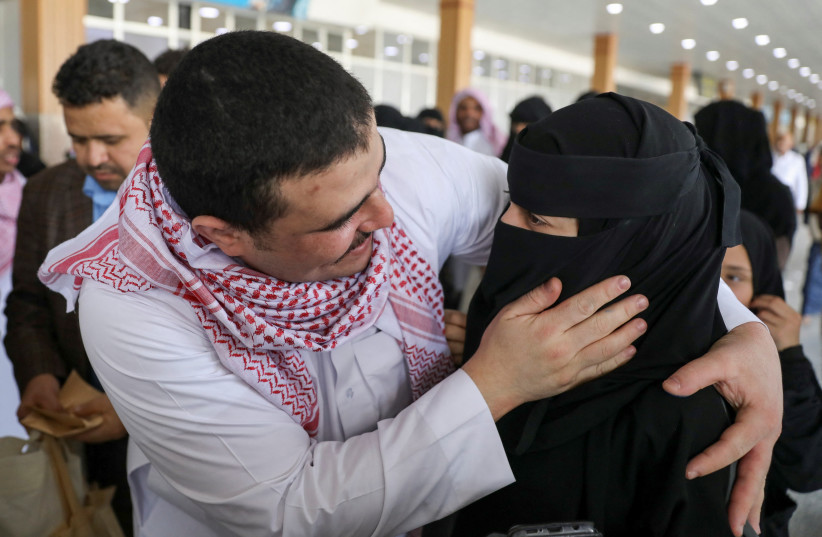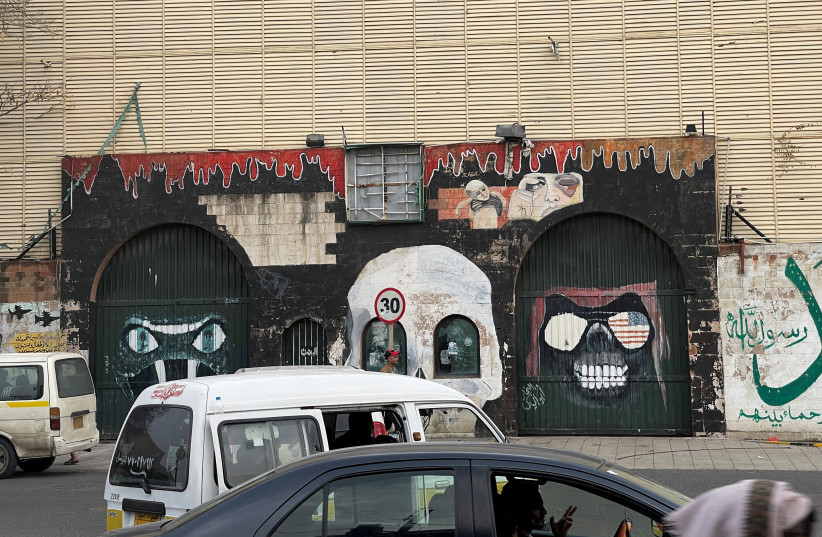More than 100 prisoners of war were flown from Saudi Arabia to Yemen on Monday as the International Committee of the Red Cross (ICRC) facilitated a “unilateral” release of detainees outside the terms of the three-day prisoner exchange that ended on Sunday. Two ICRC planes carried 48 prisoners each to Sanaa, Yemen's rebel-held capital, while a third with eight captives headed for government-controlled Aden in the south. The release of 104 captives days before Eid al-Fitr takes the total number to 973 freed since Friday.
For more stories from The Media Line go to themedialine.org
Yemen’s internationally recognized government and the Houthis, who are the de facto authorities in northern Yemen, exchanged a total of 869 prisoners on Friday in a swap organized by the UN and the ICRC.
The Yemeni civil war broke out in 2014 when the Houthis, a mostly Shia Islamist movement, took over Yemen’s capital and ousted President Abed Rabbo Mansour Hadi. A Saudi-led coalition launched a military intervention following the coup. The war has been ongoing for more than eight years, and the UN has described the resulting humanitarian crisis in Yemen as among the worst in the world. Many experts see the ongoing Yemeni civil war as a proxy war between Iran, which has backed the Houthis, and Saudi Arabia, which has backed the internationally recognized government.
During UN-sponsored talks in Geneva last month, the internationally recognized government and the Houthis agreed to exchange 887 prisoners overall—181 prisoners held by the Houthis, including 15 Saudi nationals and three Sudanese nationals, and 706 prisoners held by the Saudi-led coalition and the internationally recognized government.
The prisoners held by the Houthis include former Defense Minister Mahmoud Al-Subaihi, Political Security Bureau Deputy Head Naser Mansour Hadi, who is President Hadi’s brother, family members of former President Ali Abdullah Saleh, and four journalists who had been sentenced to death.

Friday’s large-scale release follows last week’s exchange of 13 Houthi prisoners for one Saudi prisoner that took place during a Saudi delegation visit to Yemen. The delegation opened peace talks with the Houthis with the intent of establishing a permanent ceasefire, addressing the issue of prisoners of war, and starting a full-scale political process.
‘My happiness today is beyond words’
Joy and relief were palpable at Yemen’s largest airports on Friday as family members were reunited with their newly released loved ones.
For years, Adel Mejalli believed that his younger son, Ali Adel Mejalli, had died in battle with Saudi forces like Ali’s older brother had. “Everyone told us he was killed. Even his superiors did,” Mejalli told The Media Line.
Five months ago, when Mejalli received information that his son, now 27, was being held by Saudi Arabia as a prisoner of war, he found it hard to believe. He also struggled to believe it when he was told that his son would soon be released under the prisoner exchange.
“But it happened,” Adel said. “My happiness today is beyond words.”
Fahed Al-Asbahi, whose relative Ali Abdullah was held as a prisoner of war by the Houthis, had seen previous commitments to release prisoners go unfulfilled.
“Our family was greatly disappointed,” Al-Asbahi told The Media Line. “We had waited for the release of Abdullah back in 2020, and when the negotiations to release him failed, we waited for another chance.”
After years of waiting, he and his family got that chance.
“Right now, Abdullah is among us. I cannot describe how happy the family is,” Al-Asbahi said. “We have suffered a lot and lived unforgettable moments. This war must end.”
‘Everyone is eager for peace’
Journalist Wala’ Denish stressed the importance of understanding the prisoner exchange within the context of the wider peace negotiations.

The issue of prisoners of war “is at the top of the humanitarian issues which must be addressed before going into another round of negotiations,” Denish told The Media Line.
He explained that the prisoner exchange has shaped the mood in Yemen around the peace process. “Today, everyone is overwhelmed with happiness, even those who don’t have [prisoners] of this war in their families,” he said. “Everyone is eager for peace.”
The widespread approval of the prisoner exchange may lead to more political support for the entire peace process, Denish said.
He also noted that the total number of prisoners of war is much higher than the number set to be released.
“The figure of 887 does not represent the true number of the prisoners and detainees. According to the lists announced in the Sweden negotiations back in 2018, the figure exceeds 15,000, including 1,081 POWs who were released back in 2020,” he said.
He called on the different sides to use an “all for all” exchange in the next rounds of negotiations, each releasing all of their remaining prisoners. Such a model would prove that the parties really intend to achieve full peace in Yemen, he said.
A sign of things to come
Both the internationally recognized government and the Houthis have said that a real breakthrough in the prisoners-of-war issue will come during the next round of negotiations, which is scheduled to be held in May.
“The swap which was concluded today is an important and indeed a decisive event, but it is also a part of a whole,” Majed Fadhael, the internationally recognized government’s spokesperson regarding prisoners of war, told The Media Line.
“The [internationally recognized government] delegation is working with full capacity for the release of all the POWs and the detainees in the Houthi prisons,” Fadhael said. “I hope the Houthis continue in these negotiations for the release of all the POWs and the detainees.”
Abdulkadir Al-Murtadha, chair of the Houthis’ prisoners of war committee, said during a televised interview that the Houthi movement “seeks to release all the POWs, including the political leaders.”
“During the coming round of negotiations, [the Houthi movement] will submit a proposal accepting the offer of ‘all for all,’” he said.
